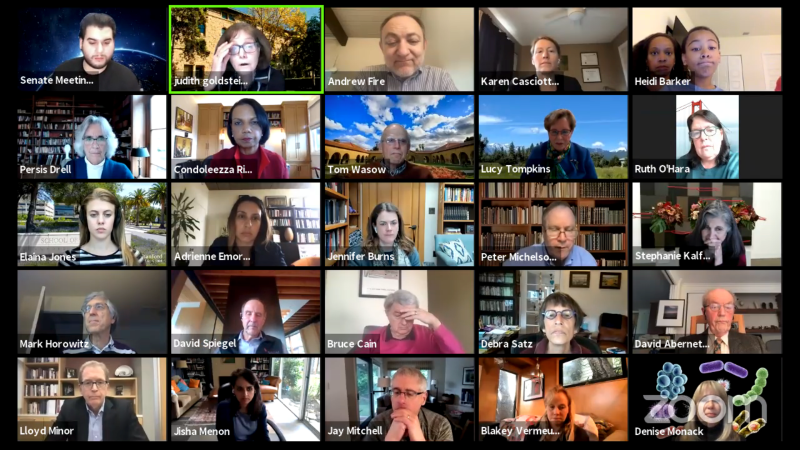Former U.S. Secretary of State and Hoover Institution Director Condoleezza Rice defended Stanford’s relationship with the Hoover Institution during the Faculty Senate’s Thursday meeting, after controversial remarks by Hoover affiliates drew new scrutiny to the University’s association with the conservative think tank.
The discussion follows an open letter signed last Sept. by over 100 Stanford faculty calling for an examination of the Institution’s relationship with the University. The letter criticized Scott Atlas, a former chief of neuroradiology at Stanford Medical Center and a former member of the White House Coronavirus Task Force under President Donald Trump, and statements he made about COVID-19, including denying the efficacy of masks. The Faculty Senate passed a resolution condemning Atlas and his remarks last November.
During the Jan. 28 meeting, Rice introduced the think tank’s governance structure, funding sources and appointment process in an effort to appease criticisms leveled against both Atlas and Hoover itself. Rice said that, despite the media attention garnered by Atlas and other fellows, the Institution’s primary — if less visible — function is research.
“We do have, amongst senior fellows, a desire to both comment on public policy issues and to affect the process, political and otherwise,” Rice said. “But I want to emphasize that it is really the research function of the Hoover Institution, and the people who engage in that research function, who are the principals of our decision making.”
Rice said the Hoover Institution’s hiring committee has been trying to address gender and racial diversity within the think tank, which she characterized as “frankly woeful,” adding that she had benefited from Stanford’s devotion to diversity in her own career. The University hired her as a Soviet specialist, partly using the Faculty Incentive Fund, a recruitment program intended to bring underrepresented groups into the faculty, according to Rice. “I was an affirmative action appointment,” she said.
In response to widely-held perceptions about Hoover’s right-wing biases, and subsequent concerns about its role within a major research university, Rice, herself a Republican, said that Hoover fellows have made roughly the same amount of political contributions to the two parties.
“If I look at questions of service, in Republican and Democratic administrations, an awful lot of people, including me, have served in Republican administrations, but people have also served in Democratic administrations,” she added, noting that political science professors Michael McFaul and Amy Zegart, both senior fellows at Hoover, worked for the Obama and Clinton administrations respectively.
Rice added that Hoover Institution’s mission statement — which highlights terms such as “private enterprise” and “the road … to personal freedom” — is a set of values articulated by President Herbert Hoover, and said they are not necessarily Republican or right-wing values.
John Etchmendy, philosophy professor and former provost, said during the meeting that Stanford has not only benefited from the academic quality of senior fellows at the Hoover Institution, but also the diversity of political opinion that it brings to Stanford.
“Now we have about nine out of 10 Stanford faculty — or faculty at any university, actually — that are Democrats,” he said. “So Hoover brings at least a little bit of political diversity, and I think that’s extremely important.”
Etchmendy added that Hoover needs to interact with Stanford students more than it does currently, in addition to working on its presence in the University.
Stephen Monismith, civil and environmental engineering professor, argued that Hoover should reconsider the way it presents its work on public platforms, pointing to website articles by Scott Atlas “continuing his attack on COVID-19 science” and Victor Davis Hanson’s “partisan attack on President Biden.” He said that these publications were not necessarily reflective of the breadth of Hoover’s work.
“Communicating to the rest of the University what you are about could be really important,” Monismith said.
Rice responded that Hoover will seek to feature more aspects of its scholarship, not just political commentaries. “Scott Atlas was a senior tenured member on the [Stanford] Medical School faculty,” she said. “He’s written on healthcare policy. We also need to get out more of the research that these people do — not just their commentary.”
Rice also said during the meeting that, while Hoover is ultimately housed within Stanford, its funding structure is largely separate from the University’s. While Hoover’s endowment is invested through the University, the think tank receives less than 2% of its operating budget from Stanford — mostly for buildings and maintenance, according to Rice.
“It is absolutely true that in the somewhat distant past Hoover has been very disjointed from the rest of Stanford,” Provost Persis Drell told the Faculty Senate in October. “But over the past decade, Hoover has become much more integrated into Stanford … In a very real sense, and I think this is important to keep in mind, they are, in fact, us.”
The discussion on the Hoover Institution is set to continue during the next Faculty Senate session on Feb. 11.
This article has been corrected to reflect that Rice said Scott Atlas was a senior tenured member on the Stanford Medical School faculty. The Daily regrets this error.
Contact Tianyu M. Fang at tmf ‘at’ stanford.edu.
